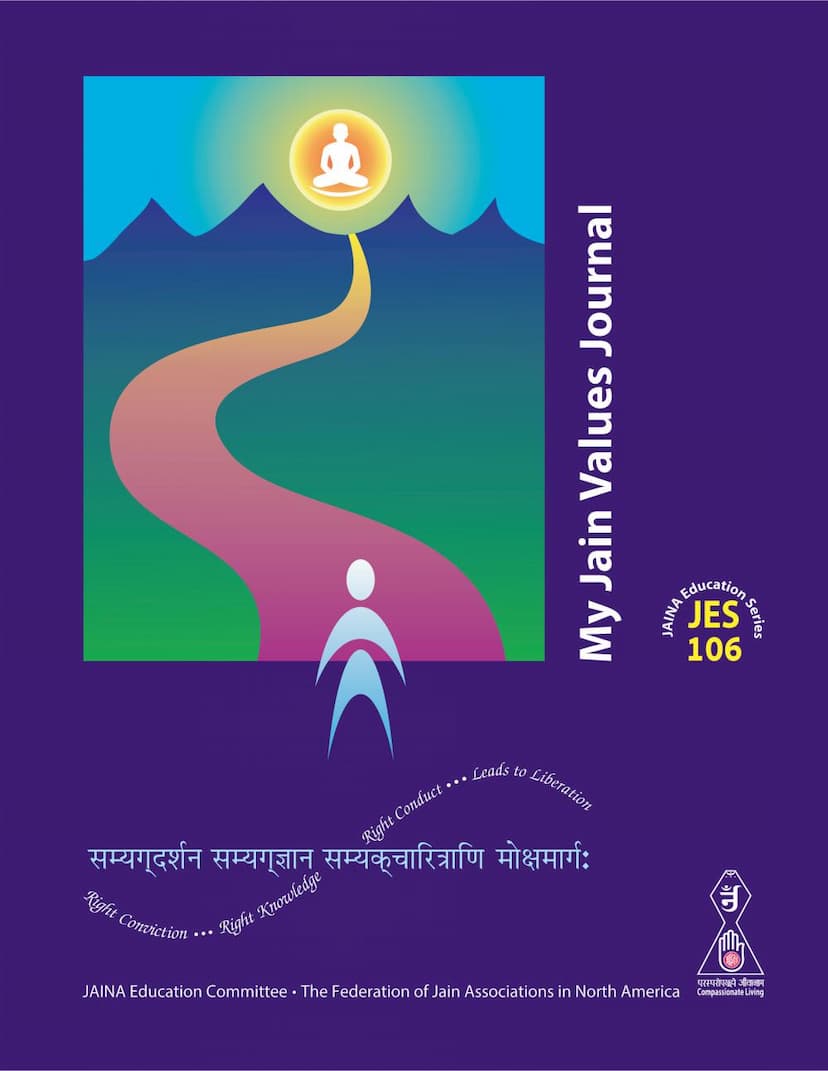JES 106 My Jain Values Journal
Added to library: September 1, 2025

Summary
Here's a comprehensive summary of the Jain text "$JES 106 My Jain Values Journal" by Pratiksha Shah, published by the JAINA Education Committee:
Overall Purpose and Approach:
"$JES 106 My Jain Values Journal" is designed to instill core Jain values in young children, fostering a happy, peaceful life and spiritual growth from an early age. The journal's approach emphasizes applying these values to daily life through practical "challenges" that encourage reflection and personal experience. The overarching goal is to equip children with the tools to navigate life with confidence, love, kindness, and compassion, by teaching Jainism as a positive path of action and inner development, rather than a list of prohibitions.
Key Themes and Jain Values Covered:
The journal presents a series of "challenges" that focus on fundamental Jain principles. These include:
- Ahimsa (Non-violence): Defined not just as avoiding harm, but also as actively demonstrating compassion, kindness, care, and love for all living beings through thoughts, words, and actions.
- Kindness: Emphasizes being considerate, friendly, treating others as one wishes to be treated, and bringing joy to others through compassionate actions.
- Being Grateful/Thankful: Encourages acknowledgment of blessings (both big and small), appreciation for others' help, and humility for what one possesses.
- Helping Others: Promotes actively assisting individuals who need support, sharing joy, and contributing to the well-being of family, friends, and even strangers.
- Being Happy - Let's Make a Pact: Fosters a conscious decision to cultivate happiness and inner peace, recognizing that happiness is a choice, even amidst challenges.
- Aparigraha (Non-possession/Non-attachment): Teaches detachment from material possessions and negative emotions. It encourages mindful consumption, donation, and avoiding accumulation of unnecessary items or grudges.
- Karma: Explains that thoughts, words, and actions lead to karma, emphasizing the importance of striving for good intentions and actions that bring positivity and smiles to others, and contribute to community well-being and environmental protection.
- Truthfulness: Highlights the importance of honesty, both with oneself and others, recognizing that truthfulness builds trust and avoids negative karma.
- Forgiveness: Encourages self-kindness by letting go of hurt, anger, and negative thoughts. It promotes responding to situations without blame or negativity, understanding that forgiveness is a choice that frees oneself.
- Compassion: Focuses on sending silent good wishes and kindness to everyone encountered, regardless of their demeanor, fostering a benevolent attitude.
- Random Acts of Kindness: Reinforces the practice of kindness through small, spontaneous actions that bring happiness to others, aligning with one's true nature.
Structure and Recommended Usage:
The journal is intended for use in conjunction with a resource titled "Being a Jain 24/7 - Journey Towards a Happy and Peaceful Life." The recommended approach for educators or parents is to:
- Introduce a Jain Value per Class: Dedicate class time to discussing one "Jain Value of the Day."
- Assign Challenges as Homework: Students are encouraged to write about their thoughts, examples, ideas, experiences, and feelings related to a specific value's challenge.
- Facilitate Sharing: Utilize a "Circle of Sharing" segment in class for students to discuss their practice of the Jain values.
- Encourage Personal Reflection: The journal serves as a personal record of each student's understanding and application of Jain values throughout the year.
Core Philosophy and Teaching Style:
The book's compiler, Pratiksha Shah, emphasizes a teaching style that focuses on the positive aspects of Jainism: peace, love, happiness, compassion, morality, and ethics. The aim is to empower children with these values, enabling them to make the "Right Thing" in various life situations. The approach is rooted in personal experience and tested through practice with children, making it relatable and actionable.
Acknowledgments and Support:
The journal is a collaborative effort, with significant contributions from the JAINA Education Committee, including Pravin K. Shah (Chairperson) and Anita Parikh. The compiler, Pratiksha Shah, expresses deep gratitude to her family, pathshala students, co-teachers, and mentors for their guidance, inspiration, and support in bringing this project to fruition. The book is made available for private, personal, and non-commercial use, encouraging respectful engagement with the religious material.